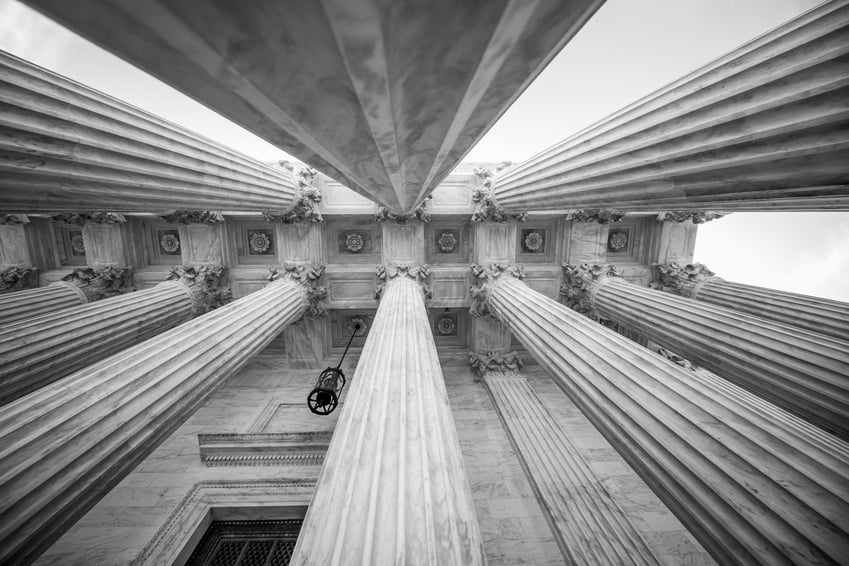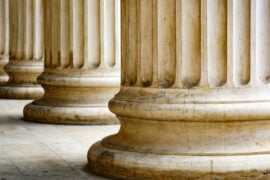When the SEC seeks disgorgement, is it asking for a fine, a forfeiture, or an equitable remedy outside the reach of the current statute of limitations? On Friday, 13 January 2017, the Supreme Court in Kokesh v. SEC, No. 16-529, granted review of the Tenth Circuit’s ruling in that an SEC disgorgement order is equitable, and not punitive in nature. The Supreme Court’s ruling in this case will likely resolve a conflict among the circuit courts about how far back the SEC can pursue disgorgement remedies — a legal question that has been pending for at least 20 years. We expect an answer this term.
The SEC has long used disgorgement as a basis for securing the return of “ill-gotten gains” or improperly obtained profits earned by wrongdoers as a result of federal securities laws violations. Unlike restitution, which focuses on making the victims of a crime whole, disgorgement’s focus is on depriving the wrongdoer of gains it would not have had but for the illegal conduct. The SEC’s position is that disgorgement is an “equitable” remedy, not subject to the applicable statute of limitations in 28 U.S.C. §2462, which states: any “action, suit or proceeding for the enforcement of any civil fine, penalty, or forfeiture, pecuniary or otherwise, shall not be entertained unless commenced within five years from the date when the claim first accrued [. . .].” For years, Federal courts and SEC Administrative Law Judges largely agreed with this proposition, although tellingly, starting about 20 years ago, tribunals began to strictly scrutinize the SEC’s characterization of certain of its remedies as equitable, including industry suspensions, bars and censures, which certain tribunals characterized as punitive, and not equitable. Johnson v. S.E.C., 87 F.3d 484, 491–92 (D.C. Cir. 1996) (holding that the limitations period in §2462 applies to SEC proceedings under section 15(b) of the Securities and Exchange Act of 1934 which seek to censure and suspend a securities supervisor). For groups in the securities industry and for SEC enforcement practitioners, notwithstanding the court’s acquiescence to the concept that disgorgement was equitable in nature, the court’s ruling in Johnson begged the question: could this logic be extended, in certain instances, to disgorgement cases? For years, the SEC was only able to obtain monetary sanctions in the form of disgorgement, pursuant to its ability to petition a court to award equitable relief. However, after Congress granted the SEC the ability to obtain civil penalties in 1984, the SEC is now armed with both disgorgement and civil penalty power.
However, as disgorgement amounts grew, and the SEC disgorgement orders reached the hundreds of millions of dollars range, some began to question whether disgorgement was, in all cases, a truly equitable remedy, especially in cases where the disgorgement amount moved far afield from any rational profit calculation. These doubts grew as a result of the SEC resisting any sensible economic and financial offsets of reasonable business expenses and overhead to the disgorgement amount. This question came to a head recently in SEC v Graham, 823 F.3d 1357, 1363 (11th Cir. 2016), where the Eleventh Circuit concluded that disgorgement is in economic reality a forfeiture within the meaning of 28 U.S.C. §2462. Thus the court applied the general statute of limitations applicable to fines and penalties to limit the disgorgement remedy.1
Shortly thereafter, the Tenth Circuit came to the opposite conclusion, making this issue ripe for the Supreme Court to weigh in. SEC v. Kokesh, 834 F.3d 1158 (10th Cir. 2016). In Kokesh, a jury found that defendant, a registered investment adviser, had violated and aided and abetted violations of the Investment Company Act, Investment Advisers Act and disclosure requirements in the 1934 Act, by making undisclosed payments to fund salaries and bonuses to insiders, including himself, and paying other improper expenses. The SEC sought disgorgement from the defendant of all improper payments for a period of more than 11 years, and the court ordered disgorgement of USD 34.9 million, plus prejudgment interest of USD 18 million. Of that amount, USD 29.9 million of the disgorgement involved payments prior to the 5-year limitations period in 28 U.S.C. §2462. In addition, the court ordered a civil fine of USD 2.4 million, representing the amount of funds the defendant received during the limitations period. The Tenth Circuit affirmed, declining to follow Graham and expand the meaning of “forfeiture” to include disgorgement. Instead, the Tenth Circuit relied on decisions from the DC Circuit and the First Circuit, which also declined to apply the statute of limitations to disgorgement claims.
Kokesh petitioned for a writ of certiorari to review the decision not to apply the statute of limitations to cut off disgorgement remedies. The Government also asked the Court to review the case to resolve the conflict in circuits. The facts of Kokesh present a stark case for the Supreme Court to address this conflict. As applied, the remedy of disgorgement looks remarkably like a forfeiture in fact. Particularly worth watching is how the Supreme Court addresses Kokesh’s argument that the SEC’s disgorgement order was punitive, because he is being forced to disgorge more than he actually personally received (as others also received some of the misappropriated money in the form of bonuses). As the goal of disgorgement is to deprive a wrongdoer of the proceeds of its wrongdoing and place that defendant back in a position it would have been without committing the violation, forcing the defendant here to pay more than he actually received would seem to serve as a punishment, especially since the SEC is fully able to name the other recipients of the ill-gotten gains as relief defendants.
1] Jerome Tomas, Peter P. Tomczak, Spencer Churchill, and Eileen Theresa Flynn, Eleventh Circuit Decision Curtails SEC’s Ability, June 2016, http://www.bakermckenzie.com/en/insight/publications/2016/06/eleventh-circuit-decision-curtails-secs-ability/.




